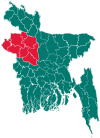Mohanpur Upazila
Geography
Mohanpur is located at 24°33′50″N 88°39′00″E / 24.5639°N 88.6500°E. It is 25 km away from Rajshahi district headquarter. It has 43984 households and a total area of 162.65 km. The Postal Code is 6220.It is surrounded by Tanore Upazila of Rajshahi District and Manda Upazila of Naogaon District to the north, Bagmara Upazila to the east, Paba Upazila and Durgapur Upazila to the south, Tanore Upazila to the west.
History
Mohanpur Thana was formed in 1917 and it was turned into an upazila in 1983.
Independence War
The local razakars established a camp in a madrasa at village Sankoa and conducted mass torture to the families of freedom fighters and other innocent people of the nearby locality. The razakars killed freedom fighter Abdul Aziz in his residence at village Bihatra; they also sacked his house. In November the freedom fighters launched an attack on the razakar camp and killed six razakars.
Demographics
According to the 2011 Census of Bangladesh, Mohanpur Upazila had 43,984 households and a population of 170,021. 31,622 (18.60%) were under 10 years of age. Mohanpur had a literacy rate (age 7 and over) of 51.25%, compared to the national average of 51.8%, and a sex ratio of 995 females per 1000 males. 29,860 (17.56%) lived in urban areas. Ethnic population was 1,223 (0.72%)>
Administration
Mohanpur Upazila is divided into Kesharhat Municipality and six union parishads: Bakshimail, Dhurail, Ghasigram, Jahanabad, Maugachhi, and Rayghati. The union parishads are subdivided into 167 mauzas and 138 villages.
Education
The Literacy Rate of Mohanpur upazila is 51.3%(males 55.3% and Females 47.2%) (7+ years). There are 82 primary schools, 52 high/junior-high schools (2 government school), 21 colleges and 21 madrasas.
Economy
The economy of Rajshahi is predominantly agricultural. The main crops of this sub-district are Paddy, wheat, jute, sugarcane, turmeric, oil seed, onion, garlic, potato, betel leaf. Betel leaf of this area is very much famous in all over the country The main fruits produced in the region are mango, jack-fruit, banana, litchi, black berry, coconut, palm, kul, guava and papaya. Rice is the staple food of the people of this area.
See also
References
- ^ National Report (PDF). Population and Housing Census 2022. Vol. 1. Dhaka: Bangladesh Bureau of Statistics. November 2023. p. 402. ISBN 978-9844752016.
- ^ "Bangladesh Postal Code". Dhaka: Bangladesh Postal Department under the Department of Posts and Telecommunications of the Ministry of Posts, Telecommunications and Information Technology of the People's Republic of Bangladesh. 21 October 2024.
- ^ Md. Anwarul Haque (2012), "Mohanpur Upazila", in Sirajul Islam and Ahmed A. Jamal (ed.), Banglapedia: National Encyclopedia of Bangladesh (Second ed.), Asiatic Society of Bangladesh
- ^ Population and Housing Census 2022 - District Report: Rajshahi (PDF). District Series. Dhaka: Bangladesh Bureau of Statistics. June 2024. ISBN 978-984-475-230-6.
- ^ "Bangladesh Population and Housing Census 2011 Zila Report – Rajshahi" (PDF). bbs.gov.bd. Bangladesh Bureau of Statistics.
- ^ "Community Tables: Rajshahi district" (PDF). bbs.gov.bd. Bangladesh Bureau of Statistics. 2011.
External links
